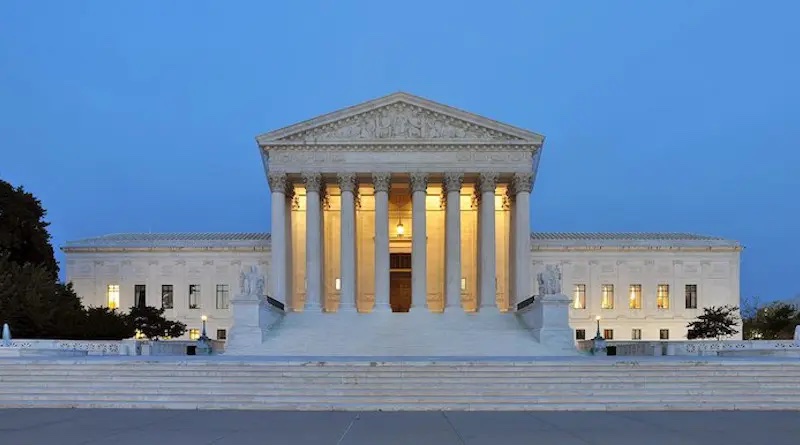Supreme Court Judges Say Obergefell A ‘Problem’ For Religious Liberty
By CNA
Justices Clarence Thomas and Samuel Alito on Monday said that the Supreme Court’s Obergefell ruling is already posing problems for religious freedom.
“By choosing to privilege a novel constitutional right [to same-sex marriage] over the religious liberty interests explicitly protected in the First Amendment, and by doing so undemocratically, the Court has created a problem that only it can fix,” the justices wrote in an opinion published Monday.
“Until then, Obergefell will continue to have ‘ruinous consequences for religious liberty,’” they warned.
In their opinion, which accompanied the Court’s denial of a writ of certiorari in the case Davis v. Ermold, Thomas and Alito said that the 2015 landmark decision pitted same-sex marrriage against religious liberty.
In the case of former county clerk Kim Davis of Kentucky, who in 2015 made headlines for refusing to issue marriage licenses to same-sex couples, Thomas and Alito joined the court in denying her petition for a writ of certiorari, or a review of her case, on the first day of the court’s fall term.
Davis was sued for not issuing marriage licenses after the Obergefell ruling declared a right to same-sex marriage. The Sixth Circuit appeals court in 2019 ruled that she was not protected from qualified immunity, and thus could be held personally liable for infringing on the constitutional rights to marriage of same-sex couples.
In a statement accompanying the denial of certiorari, Alito and Thomas said Davis’ petition “does not cleanly present” the issues at hand in the Obergefell ruling. However, they sharply criticized the 2015 ruling for posing serious and unnecessary challenges to those religiously believing marriage is between one man and one woman.
The 5-4 ruling, authored by Justice Anthony Kennedy, said that same-sex couples could not be “excluded from one of civilization’s oldest institutions.” It also said that to deny them “the same legal treatment as opposite-sex couples” would “disparage their choices and diminish their personhood.”
This language of “disparage” and “diminish,” Alito and Thomas said on Monday, casts religious beliefs in traditional marriage as bigoted and lends credence to officials and judges who say so.
Kennedy’s ruling also usurped the legitimate authority of the states to craft religious exemptions for many Americans holding these beliefs, the justices argued.
“It would be one thing if recognition for same-sex marriage had been debated and adopted through the democratic process, with the people deciding not to provide statutory protections for religious liberty under state law,” Alito and Thomas wrote.
“But it is quite another when the Court forces that choice upon society through its creation of atextual constitutional rights and its ungenerous interpretation of the Free Exercise Clause, leaving those with religious objections in the lurch.”
They added that the Obergefell ruling “enables courts and governments” to label believers in traditional marriage “as bigots, making their religious liberty concerns that much easier to dismiss.”
Religious freedom concerns were expressed at the Court even before the ruling was issued in 2015.
During oral arguments in Obergefell, Justice Antonin Scalia asked the Solicitor General Donald Verilli if religious colleges could lose their tax-exempt status for objecting to the redefinition of marriage, if the court recognized a constitutional right to same-sex marriage. Verilli later said that “it’s certainly going to be an issue.”
After the ruling, U.S. bishops and their lawyers warned that it insufficiently guaranteed the religious freedom of those objecting to the redefinition of marriage.
The decision “makes a nod in the direction of religious liberty but not enough of one,” the USCCB’s then-religious liberty committee chair Archbishop William Lori of Baltimore told EWTN News Nightly.
It failed to define the free exercise of religion as something practiced while “interacting with the broader society”—thus opening the door to litigation against religious believers who object to the redefinition of marriage while in public settings, the archbishop said.
The courts are already showing hostility to some religious believers, Thomas and Alito wrote in their opinion, pointing to the concurrence of one Sixth Circuit judge in Davis’ case who sincerely held religious beliefs as ‘anti-homosexual animus.’”
Davis, the justices said, was forced to choose between her religious beliefs on marriage and upholding the law as a public official, as a result of Obergefell.
“Davis may have been one of the first victims of this Court’s cavalier treatment of religion in its Obergefell decision, but she will not be the last,” the justices wrote.
“Due to Obergefell, those with sincerely held religious beliefs concerning marriage will find it increasingly difficult to participate in society without running afoul of Obergefell and its effect on other antidiscrimination laws.”
Anthony Picarello, general counsel for the U.S. bishops conference, said in 2015 that litigation could occur as a result of Obergefell, that could affect the tax-exempt status of religious non-profits, as well as employee benefits, employment, and school accreditation.
“We’ve seen already many of these disputes emerge in states that have already recognized same-sex marriage. We’ve seen them in states that have aggressive sexual orientation, gender identity, and anti-discrimination laws,” he said.

